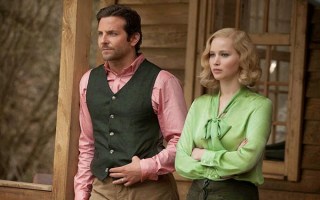‘Tis a pity: given the star power and promises of period drama, Serena (2014) fizzles onscreen very quickly. Through casting switch-ups and an extended production window, the hope of a solid product would naturally be quite high. Even with the bankability of of its lead actors firmly in place, and an acclaimed helmer in Susanne Bier, it bows under the pressure of high expectation. Although it is a beautiful film to look at, the heartlessness soon shines through, exposing problematic constructions within a thematically intriguing story. Caught in the throes of the Great Depression, logging baron George Pemberton (Bradley Cooper) is awash in debt and worry.
At a financial crossroads, George sojourns from his North Carolina mill to debutante-ridden Boston to find himself a wife with a fortune that can help reignite his fortunes. There he meets Serena (Jennifer Lawrence), an orphaned heiress with a throughly modern approach to business. The formidable pair quickly marry and return to North Carolina, where threats to the Pemberton empire – including an illegitimate child and ruthless business partners – lurk around every corner. Also evident is the fact that the film feels like a favor being carried out by cast and crew alike. There is a lackluster, half-hearted quality to the performances here and while Cooper and Lawrence have proven their onscreen chemistry is palpable in Silver Linings Playbook (2012), in Serena it feels old hat.
As Serena, Lawrence (who shines best when rooted in calm ferocity) simply fumbles. She must go from cool confidence to femme fatale, but Lawrence’s performative transition reads far too patchy. In one particular scene, Serena is pulling an ‘its me or your child’ routine. As George refuses to listen and walks away, Serena goes from even-keeled to enraged, demanding George just kill her instead. It’s atypical of the woman Lawrence has constructed and feels hokey in comparison to the rest of her turn. Perhaps what contributes to the hollowness of Serena is the timing of the film’s release. Given the recent meteoric rises of Cooper and Lawrence, respectively, an independent drama at this point in their separate careers feels like a downturn.
More confusing the quality of the supporting cast – Rhys Ifans, Toby Jones and David Dencik, to name a few – as well as the sure-handed direction of Bier, who is most notable for Brothers (2004) and After the Wedding (2006), all seem to strain under the weight of a melodramatic plot camouflaged as high-stakes drama. Serena has all the necessary moving parts that should propel it to notoriety; with its pedigree, this film should have been a cinematic home run. While it contributes modern sensibilities to marital gender roles and offers a thoughtful commentary on the necessary security and stability of the home as well as commercial empire, Serena falls hopelessly flat.
Allie Gemmill | @alliegem



